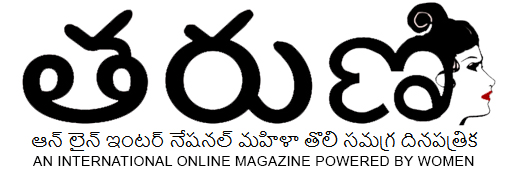.From Celebration to Objectification: The Journey of Women in Telugu Music:-
బంగారు పాపాయి బహుమతులు పొందాలి,
పాపాయి చదవాలి మామంచి చదువు ||
పలు సీమలకు పోయి, తెలివిగల పాపాయి
కళలన్ని చూపించి ఘనకీర్తి పొందాలి
ఘనకీర్తి పొందాలి, ఘనకీర్తి పొందాలి! ||
మా పాప పలికితే మధువులే కురియాలి!
పాపాయి పాడితే పాములే ఆడాలి!
ఏ దేశమేజాతి ఎవరింటిదీ పాప?
ఎవ్వరీ పాపాయి అని ఎల్లరడగాలి,
పాపాయి చదవాలి మామంచి చదువు
పాపాయి చదవాలి మామంచి చదువు||
తెనుగుదేశము నాది, తెనుగు పాపను నేను
అని పాప జగమంతా చాటి వెలయించాలి,
మా నోములపుడు మాబాగా ఫలియించాలి!
_**__
ఈ పాట లోని భావం ఒక పాపాయి (బాలిక) గురించి. బంగారం లాంటి పాపాయి మంచి చదువు చదవాలని, వివిధ ప్రాంతాలకు వెళ్లి తెలివితేటలతో గొప్ప పేరు తెచ్చుకోవాలని అభిలాషను వ్యక్తం చేస్తుంది.
పాటలోని ముఖ్యమైన అంశం విద్యా సాధన, పాపాయి ప్రతిభ, మరియు తెనుగు భాషపై గర్వాన్ని చాటిచెప్పడం.
Looking back at the evolution of songs for women in Telugu cinema, it’s hard not to feel a mix of pride and disappointment. It all began with songs like Bangaru Papayi by Bala Saraswathi, this poem/song celebrates the aspirations of a young girl, symbolically referred to as “the golden girl.” It emphasizes the importance of education and the pursuit of knowledge, urging her to excel academically and showcase her talents across various regions. The verses highlight her intelligence and creativity, suggesting that her words and songs should enchant the world. It also expresses a deep pride in her identity as a Telugu girl, advocating for the recognition and appreciation of her culture. Ultimately, it conveys a powerful message about empowerment, education, and the impact of a strong cultural identity. Another song to think is Muddabanthi puvulu petti from the movie Kalasi unte kaladu sukham where women were celebrated with dignity and grace. These songs uplifted the idea of womanhood, portraying us as pillars of strength, beauty, and emotional depth. It felt empowering to see women honored, not just for their looks, but for their hearts and minds.
Take a song like Illale Ee Jagathiki from the movie Devatha, it was a powerful reminder that women are the backbone of this world, the ones who nurture families and society. Even later, with Swarnakamalam’s Shivapujaku, women were shown in a space of reverence, where our beauty was intertwined with spirituality and art. These songs made me proud, they spoke to the soul, celebrating us for who we truly are.
But somewhere along the way, that respect started to erode. By the time songs like Yeh Chilipi Kallalona from Gharshana came around, the shift was clear. It was more playful, light, focusing on modern, urban women, yet still maintaining a certain charm and respect. But from there, it was a slippery slope.
Today, many songs have taken a turn for the worse. It’s frustrating and heartbreaking to see how the focus has shifted from our inner strength and grace to objectifying us, reducing women to mere objects of desire. The lyrics and visuals that once celebrated our essence now often seem to treat us like commodities, more about appearances than substance. It feels regressive, like we’ve lost the respect and reverence that used to be so inherent in these portrayals.
As Swarnakamalam reminds us, “Swadharme Nidhanam Shreyah, Paradharmo Bhayaavahah”—it is better to live and die in truth than to stray into falsehood. By turning away from authentic portrayals, we are choosing the dangerous path of superficiality, objectification, and loss of identity.
We must return to valuing women for who they truly are—not just in songs, but in society. Let’s remember that true progress lies in celebrating the full depth of a woman’s essence, her strength, her mind, and her spirit. Only then can we build a culture that honors and uplifts women, rather than diminishing them.
In today’s world, many women are drawn toward goals like fame, and misguided notions of feminism that equate empowerment solely with independence from traditional values. In the pursuit of success, some women may prioritize external validation over personal fulfillment or deeper purpose. The desire for fame can lead to choices that emphasize appearance and public image over substance, while certain interpretations of feminism focus on rejecting femininity or traditional roles altogether, rather than embracing true equality and the freedom to choose one’s own path. This shift can create a disconnect from authentic empowerment, where real strength lies in knowing and owning one’s identity, rather than chasing ideals that diminish our intrinsic value.
